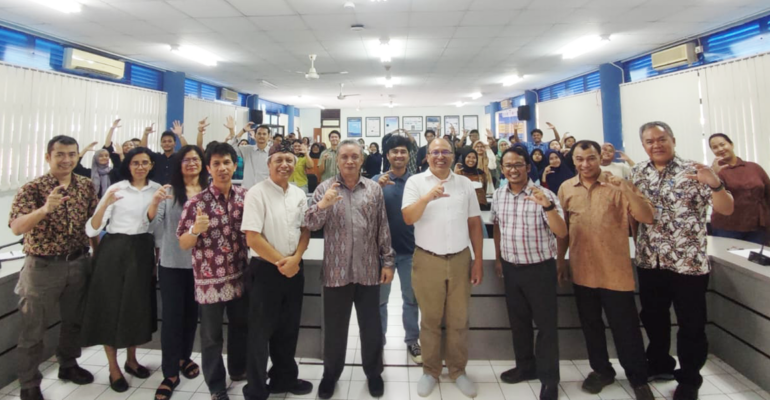Through the WCP Program, a Professor from Japan Shares Knowledge about Marine Radar Remote Sensing at IPB University

The Faculty of Fisheries and Marine Sciences (FPIK) at IPB University organized the International Guest Lecture 2023 featuring Prof Josaphat Tetuko Sri Sumantyo from Chiba University, Japan. During the event, Prof Josaphat shared knowledge about marine radar remote sensing, which was enthusiastically attended by faculty members and students from FPIK at IPB University.
This activity is part of the World Class Prof (WCP) 2023 program initiated by the Ministry of Education, Culture, Research, and Technology (Kemendikbud) of Indonesia. It aims to expand networks and enhance collaboration with renowned universities worldwide to improve the quality of education in Indonesia.
One of the faculty members from FPIK at IPB University, Prof Jonson Lumban Gaol, was selected as a recipient of the WCP 2023 program. The primary goal of WCP is to publish joint publications in international journals. Additionally, workshops are held for postgraduate students on the topic of writing papers for international journals and planning dual-degree programs.
Prof Jonson also had the opportunity to refine the draft publications during his stay of approximately one month at Chiba University. “We hope this activity opens opportunities not only for faculty members to expand their knowledge internationally but also for students. Moreover, the topic of marine radar in Indonesia still needs development, so in the future, we can follow in the footsteps of Professor Josaphat,” said the IPB University Professor.
Since childhood, Prof Josaphat has observed that most of the radar products used in Indonesia are imported. This inspired him to develop an original circularly polarized synthetic aperture radar (CP-SAR) design. The owner of the Josaphat Microwave Remote Sensing Laboratory has developed a range of microsatellites used for various purposes, such as observing the relationship between ionospheric phenomena and land deformation, land cover mapping, disaster monitoring, ship detection, and marine monitoring.
“In addition to providing real-time data, radar sensor data is less affected by atmospheric conditions compared to optical sensor monitoring. Therefore, the results obtained are better and provide more accurate information,” explained the patent holder of CP-SAR from Chiba University.
Dr Agus Oman Sudrajat, the Vice Dean of FPIK at IPB University for Academic and Student Affairs, expressed his appreciation for Prof Josaphat’s presence and the valuable knowledge he shared. He also reaffirmed IPB University’s commitment to supporting research and development in the fields of marine science and remote sensing technology.
“Hopefully, this opens up opportunities for students to be accepted at Chiba University and deepen their insights into remote sensing, especially radar,” Dr Agus said. (RAT/Rz) (IAAS/Hap)


